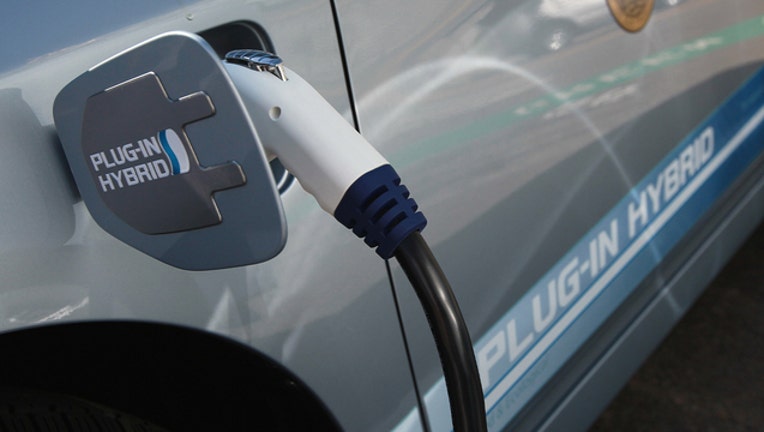New bill proposes nation's first charging network for electric cars in Michigan

(FOX 2) - Since she purchased a Chevy Bolt, Mallory McMorrow wondered if she could drive from Detroit to Marquette in an Electric Vehicle.
As of now, she estimates it would become a week-long excursion getting from the Motor City to Michigan’s upper peninsula. However, the time it would take to travel from point A to B may soon shrink.
On Wednesday, a four-part bipartisan package of bills was introduced to the Michigan legislature. The objective is to create a statewide electric vehicle charging network.
“How cool would it be if we can market a Pure Michigan road trip?” said Senator McMorrow, D-Royal Oak. “It’s really exciting. We’ve worked really hard for the last six months.”
The legislation is a package of four separate bills that are sponsored by a bipartisan group of eight legislators. Together, they make up one of the first statewide initiatives in the country that embraces electric vehicle charging. It engages Michigan’s infrastructure, environment and small business, fitting what McMorrow describes as that “sweet spot” in Michigan politics.
“The overarching goal is to expand the state’s charging infrastructure,” said McMorrow.
The first of four bills establishes a counsel of experts on energy, technology and transportation under the Michigan Department of Transportation. Together the individuals would be tasked with developing a plan of where to implement these charging stations that would be coordinated with utilities and private companies around the state.
The following two bills engages the state parks by allowing the state to install and lease space for charging stations at those parks. The revenue that would be generated from leasing those spaces would go toward the park system.
Finally, the fourth bill would provide tax incentives for small businesses and multi-unit housing projects to install electric vehicle charging stations.
“We are at a tipping point where we have to execute now or we’re going to lose industry,” McMorrow said. “We need to keep industry and attract more people to it.”
Glenn Stevens is executive director of MICHauto, which represents stakeholders for the automotive industry was sitting in his car at a Petoskey State Park parking lot when the legislation was announced.
“I’m looking at the parking lot and thinking, ‘wouldn’t it be nice if there were charging stations here?’” he said.
Currently finding a charging station in Michigan can be tricky.

In December, 2018, the Detroit Regional Chamber analyzed the feasibility of driving from Detroit to Traverse City in an electric car. In the article, a map of Michigan shows different routes taken by a Nissan LEAF, Chevrolet Bolt and Tesla 3. “Overall, the results were mixed based on the vehicle model and number of charging stations,” read a caption from the story. One of the biggest determining factors for the routes was the location of charging stations.
Stevens is also the vice president of Automotive & Mobility Initiatives with the Detroit Chamber - which has endorsed the legislation. He said Michigan’s automotive industry makes it a prime candidate to pioneer the state, as well as the country, toward a more electric vehicle-friendly future.
“Having a full electric vehicle or even a hybrid - being able to get across the state (in one) is a challenge. We need to eliminate that challenge,” Stevens said. “This is our significant industry. But the industry is transforming dramatically, and as the world becomes more connected and automated, Michigan needs to have a leadership role.”
An economic analysis by MICHauto found the auto industry contributes $225 billion to the state’s economy. Legislation like this helps make it easier for more investment to come into the state; in a manufacturing sense as well as a green one.
For people that own a home and an electric car, powering that vehicle isn’t always a struggle. However, for those that rent an apartment, there’s a bigger barrier. McMorrow said there had been talk of mandating developers to install charging stations at new multi-unit housing projects.
She thinks there’s a better way to incentivize developers.
“We want to encourage adoption without forcing developers,” she said. “This can be attractive to tenants. That’s how the bill functions.”
Six months may feel like a long time to produce four bills, but there are few examples of legislation like this. Only a couple other states have signed laws relating to charging stations, which is part of the reason lawmakers went through dozens of drafts before they finalized on bills they were happy with. Much of the legislation started from scratch.
Lawmakers also talked to energy groups, industry experts, the League of Conservation Voters, conservative energy groups and utilities. Sponsors and co-sponsors of the bill includeLegislators co-sponsoring bills include: Julie Alexander, R-Jackson, Joe Bellino, R-Monroe, Erika Geiss, D-Taylor, David LaGrand, D-Grand Rapids, Kim LaSata, R-Bainbridge Township, Yousef Rabhi, D-Ann Arbor, Tim Sneller, D - Burton

